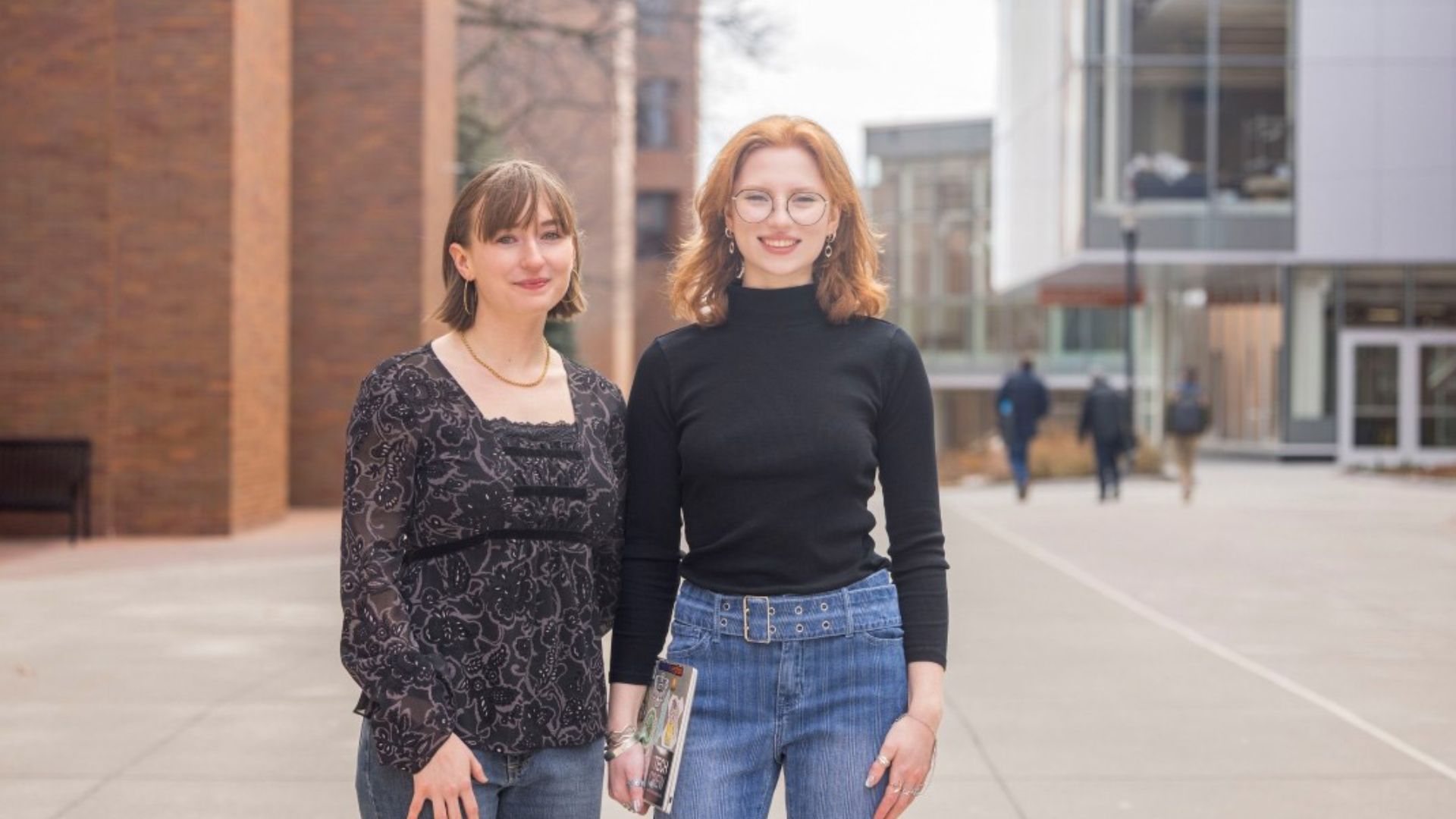Local News
Students develop AI tool to support UN efforts for Ukrainian refugees

Rochester, New York – In a groundbreaking initiative, two students from Rochester Institute of Technology (RIT) are utilizing artificial intelligence (AI) to enhance humanitarian efforts for Ukrainian refugees. Their innovative tool aims to provide real-time insights from social media discussions, helping organizations like the United Nations Migration Agency (IOM) make data-driven decisions more efficiently and cost-effectively.
A Student-Driven Solution to a Global Crisis
Natalie Crowell and Olivia Croteau, both third-year humanities, computing, and design majors, are at the forefront of this AI-driven humanitarian project. They have been developing a tool that analyzes publicly available social media conversations, specifically focusing on chat groups where refugees discuss urgent needs like housing, food, and medical assistance.
“The goal is to make AI tools as accessible as possible to the people running humanitarian aid,” said Croteau, a double major in new media interactive development.
Read also: New School-Based Health Center opens at Monroe High School
Their tool, once fully operational, could significantly improve how organizations like IOM respond to the ongoing refugee crisis in Poland, where around one million displaced Ukrainians have sought refuge.
How It All Began
Crowell and Croteau’s journey began in an RIT Python coding class, where they first met and formed a friendship. Later, Crowell’s coursework in geographic information systems introduced her to research conducted by Professor Brian Tomaszewski, a faculty member at RIT’s School of Interactive Games and Media. Tomaszewski had recently conducted studies on forced displacement using large-language models and had collaborated with IOM staff to analyze the refugee crisis in Poland.
Recognizing the potential to expand on Tomaszewski’s research, Crowell and Croteau quickly drafted a proposal outlining their AI-powered tool. Their proactive approach and innovative thinking impressed Tomaszewski, who welcomed them onto the project.
“Natalie and Olivia are just another example of the amazing students we have here,” said Tomaszewski. “They are directly on the front line of recent upheavals with the foreign assistance given by the United States, which in some sense is frustrating, but also a good learning experience at the beginning of their careers considering humanitarian work.”
Leveraging AI for Humanitarian Aid
The AI tool currently in development extracts data from Telegram, a widely used messaging platform among Ukrainian refugees. Each day, thousands of individuals post in group discussions, seeking assistance and sharing information. Although humanitarian workers actively monitor these messages, manually processing such a vast volume of data can be overwhelming.
Read also: Circuit board campus design wins Imagine RIT poster contest
The students’ AI tool categorizes discussions into specific themes identified by IOM, including mobility, education access, housing accommodations, and protection needs. Furthermore, natural language processing enables the tool to detect references to locations and landmarks while also translating messages into different languages for broader accessibility.
“Humanitarian aid workers typically have to deliver reports, with graphs and visual data,” said Croteau. “Having interactive data is a great way to get the message across.”
A key feature of the tool is a dashboard that visually represents AI-processed data. Using geocoding, the system can generate maps indicating where resources are most needed. It also includes confidence scores and AI-generated summaries highlighting major trends and frequently asked questions within refugee discussions.
“What’s great is that this data is coming directly from the people and what the people need,” said Crowell. “As humanitarian researchers, listing the source of data is essential.”
Impact on Humanitarian Efforts
To refine their tool, Crowell and Croteau are collaborating with Harley Emery, a data and research officer at IOM Poland. While speaking on her own behalf, Emery emphasized the critical role of data in identifying and addressing the needs of vulnerable refugee populations.
“While IOM has many of its own methods for gathering and analyzing data on displaced people, I have yet to see a ready-to-use tool that can analyze public social media data on the fly, as this project aims to,” said Emery. “I see a tool like Natalie and Olivia’s being used as a way to rapidly analyze and summarize public discourse online—at low-cost and requiring very little time—to gain initial insights which could then be explored and verified further as needed.”
The AI tool’s scalability presents a compelling advantage. Beyond the Ukrainian refugee crisis, it could be adapted to other humanitarian emergencies worldwide, offering organizations a low-cost, high-impact solution for real-time data analysis.
Despite challenges posed by political environments and funding constraints, Crowell and Croteau remain committed to advancing their project. They plan to present their research at the IEEE Global Humanitarian Conference, further expanding its visibility and potential applications.
“It’s invigorating to use AI to make meaningful impact,” said Croteau. “This is about more than just tech—it’s about being part of the solution.”

-

 Local News10 months ago
Local News10 months agoNew ALDI store close to Rochester to begin construction in late 2025 or early 2026
-

 Local News10 months ago
Local News10 months agoRochester Lilac Festival announces exciting 127th edition headliners
-

 Local News8 months ago
Local News8 months agoCounty Executive Adam Bello and members of the county legislature celebrate exceptional young leaders and advocates at the 2025 Monroe County Youth Awards
-

 Local News8 months ago
Local News8 months agoThe 2025 Public Market Food Truck Rodeo series will begin this Wednesday with live music by the Royal Bromleys